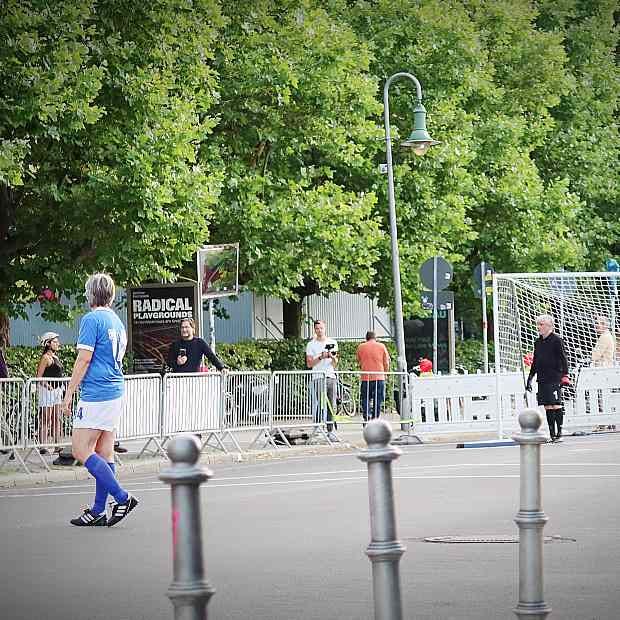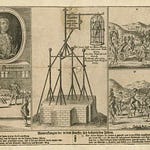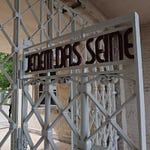It's a crisp Sunday evening in July, and about a hundred of us are sitting on improvised tribunes outside the Gropius Bau, one of Berlin's hippest museums. But we're not here for an art exhibition.
We're about to watch something very special - a football match like no other.
In front of us, at the centre of the street stage: just two actors, no ball, and the pitch is just four strips of tape stuck to the road. At each end of the street are two goals, like the ones you see in the neighbourhood playgrounds. The street: we're on Niederkirchnerstraße, where you can still see sections of the Berlin Wall. A stone's throw away is Potsdamer Platz, and a few metres away is the Topography of Terror Centre, the former headquarters of the Gestapo.
We are watching a match without a ball, but with the original sounds all around us: in our hands we have the original commentaries from our mobile phones, pre-installed and made to sound loud, mimicking the old pocket radios of the seventies. To add to the immersive experience, two large loudspeakers on the side of the road also play the commentary. So we're not just watching - we're using our imaginations to bring a piece of history to life.
The game we're about to watch wasn't famous for great goals or fancy footwork. But ask any German over the age of 50, East or West, and they'll tell you it was something special. It was the only time East and West Germany met on a football pitch as equals, with an unexpected, once-in-a-lifetime result.
Between sport and politics.
It was Saturday 22nd June 1974. Hamburg's Volksparkstadion was packed to the last seat. On the pitch were the national teams of West Germany (the reigning European champions) and East Germany (the underdogs with a point to prove). It was about football. It was also about politics.
The East German team were feeling pretty good. They'd already qualified for the next round, so the pressure was off. But make no mistake, they were still the underdogs. As their goalkeeper Jürgen Croy put it years later: "For us, it was a sporting competition in which we had to measure ourselves against very good individual players and a very good team that eventually became world champions. It was a chance for each of us to make a name for ourselves in front of a world audience.
On the political side, the pressure was on the players, but also on the fans. The Stasi, the East German secret police, left nothing to chance: only 1,500 supporters were allowed to travel from the GDR to West Germany, among
"...citizens who, as conscious socialist citizens, actively participate in political and social life and have proven their political reliability," read the Stasi instructions.
Although their loyalty was supposed to be granitic, they were to be "kept under control in their working, living and leisure areas until their departure for the games".
The infamous Stasi informers (IM) were used for this purpose. Even the chants in the stadium were dictated from above: the cheer "7-8-9-10-Class", which can be heard in original TV recordings, comes from an East German TV show in which schools competed against each other - the winners were celebrated accordingly, from "1-2-3-" to "8-9-10-", getting louder each time. This was the only chant officially allowed for the supporters of the DDR team.
Something unexpected happened on the pitch: the West German team, although full of world-class champions, failed to mount a real attack in the first half. The East Germans held strong.
Then, in the 77th minute, Jürgen Sparwasser scored for East Germany with a mixture of luck and talent, was in the wrong position and had misjudged a pass from his team-mate Erich Hamann:
"The ball bounced, I wanted to take it with my chest, but it hit my little button nose, changed direction, the three who were chasing me stopped and I was through," he recalled 50 years later, still surprised by the outcome.
Just like football. This is how history is sometimes made: with a touch of nose. The East German team celebrated hard that night, and even the ever-watchful Stasi joined in.
But this "victory over the class enemy" actually made things harder for East Germany in the long run. They ended up facing tougher teams in the next round - football giants like Brazil, Argentina, and the Netherlands - and were eliminated.
Meanwhile, West Germany used the defeat as a wake-up call. They bounced back, sailed through an easier second round with wins over Yugoslavia (2-0), Sweden (4-2) and Poland (1-0), and ended the tournament with a 2-1 victory over the Netherlands.
Every story has its hero.
Jürgen Sparwasser, now 76, is the unlucky hero of this story and ultimately another victim of the DDR system. Many people there envied his success, believing that it gave him special privileges. In fact, he only received the same bonus as all the other players. In the next few years, like all the great sports champions of the DDR, he was kept under special surveillance by the Stasi, for fear that he might flee the country. Nevertheless, he managed to defect to West Germany during a football match in Saarbrücken in 1988, where he had a brief managerial career before retiring.
In the Berliner time machine.
Fast forward to today, and we're all here - former East Germans, children born after reunification, and people like me from all over - being drawn into this piece of history. As the re-enactment unfolds, we're all singing together, just like 50 years ago. When the goal was scored in the 77th minute, we all chanted "Bravo, Bravo, Bravo!" echoing the original tone of the DDR commentary. It was not politics, it was empathy. And, it was more than just football - it was a time machine full of passion, fun and a touch of nostalgia.
A Reenactment of the 1974 East Germany – West Germany World Cup Match by Massimo Furlan with Tanja Walther-Ahrens.
Massimo Furlan's re-enactment of the historic 1974 World Cup - a performance developed and performed in 2018 - is part of the art cycle 'Radical Playgrounds: From Competition to Collaboration" of the Berliner Festspiele. More information: www.berlinerfestspiele.de.










